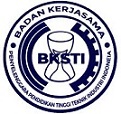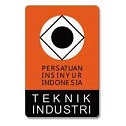- Focus and Scope
- Section Policies
- Peer Review Process
- Publication Frequency
- Open Access Policy
- Archiving
- Fees
- Publication Etchics Statement
- Indexing Site
Focus and Scope
Jurnal Teknik Industri (JTI) mainly focuses on publishing scientific articles from research in the field of Industrial Engineering and Management. Then, detailed scopes of articles involving:
Work System and Ergonomic
Supply Chain and Logistic
Marketing and Financial
Sustainable Energy
Production Planning and Inventory Control Management
Modeling and Simulation System
Manufacturing facility Design
Management of Information Systems and Design
Optimization and mathematical modeling
Halal Supply Chain
Section Policies
Articles
Peer Review Process
Jurnal Teknik Industri selects peer review in reviewing the submitted manuscript. The editor checks the manuscript related to the suitability of the theme with the focus and the scope of the journal. Each manuscript will be reviewed (double-blind review) by at least two independent reviewers who are within the subject area. It is an objective process at the heart of good scholarly publishing and is carried out by all reputable journals.
If the paper is accepted subject to modification, the editor will send the review reports to the author/corresponding author including a formal request to modify the paper by a maximum of one month as per the suggestions of the reviewers. The author will send the modified paper to the same reviewer of the said paper to justify the modifications. If the paper is again returned by the reviewer, the paper is said to be finally rejected. The journal will not proceed with the said paper. However, in case of very minor changes, the editorial board may consider the paper for further modifications.
The accepted paper is processed for publication upon the successful completion of the journal’s terms and conditions.
Publication Frequency
Jurnal Teknik Industri (JTI) will publish two times in years involving :
- June
- December
Open Access Policy
Jurnal Teknik Industri: Jurnal Hasil Penelitian dan Karya Ilmiah dalam Bidang Teknik Industri provides immediate open access to its content on the principle that making research freely available to the public support a greater global exchange of knowledge.
Archiving
This journal utilizes the LOCKSS system to create a distributed archiving system among participating libraries and permits those libraries to create permanent archives of the journal for purposes of preservation and restoration. More...
Fees
APC
Publication Etchics Statement
Jurnal Teknik Industri : Jurnal hasil Penelitian dan Karya Ilmiah dalam Bidang Teknik Industri is a peer-reviewed journal, available in print and online and published twice a year. Ethical behavior of all parties involved in the act of publishing articles in this journal, including authors, chief editors, Editorial Board, peer reviewers, and publishers is regulated in this provision. This provision is based on the Best Practice Guidelines for the COPE Journal Editor.
Fair Play
An editor at any time evaluate manuscripts for their intellectual content without regard to race, gender, sexual orientation, religious belief, ethnic origin, citizenship, or political philosophy of the authors.
Confidentiality
The editor and any editorial staff must not disclose any information about a submitted manuscript to anyone other than the corresponding author, reviewers, potential reviewers, other editorial advisers, and the publisher, as appropriate.
Disclosure and conflicts of interest
Unpublished materials disclosed in a submitted manuscript must not be used in an editor's own research without the express written consent of the author.
Duties of Reviewers
Contribution to Editorial Decisions
Peer review assists the editor in making editorial decisions and through the editorial communications with the author may also assist the author in improving the paper.
Promptness
Any selected referee who feels unqualified to review the research reported in a manuscript or knows that its prompt review will be impossible should notify the editor and excuse himself from the review process.
Confidentiality
Any manuscripts received for review must be treated as confidential documents. They must not be shown to or discussed with others except as authorized by the editor.
Standards of Objectivity
Reviews should be conducted objectively. Personal criticism of the author is inappropriate. Referees should express their views clearly with supporting arguments.
Acknowledgement of Sources
Reviewers should identify relevant published work that has not been cited by the authors. Any statement that an observation, derivation, or argument had been previously reported should be accompanied by the relevant citation. A reviewer should also call to the editor's attention any substantial similarity or overlap between the manuscript under consideration and any other published paper of which they have personal knowledge.
Disclosure and Conflict of Interest
Privileged information or ideas obtained through peer review must be kept confidential and not used for personal advantage. Reviewers should not consider manuscripts in which they have conflicts of interest resulting from competitive, collaborative, or other relationships or connections with any of the authors, companies, or institutions connected to the papers.
Duties of Authors
Reporting standards
Authors of reports of original research should present an accurate account of the work performed as well as an objective discussion of its significance. Underlying data should be represented accurately in the paper. A paper should contain sufficient detail and references to permit others to replicate the work. Fraudulent or knowingly inaccurate statements constitute unethical behaviour and are unacceptable.
Data Access and Retention
Authors are asked to provide the raw data in connection with a paper for editorial review, and should be prepared to provide public access to such data (consistent with the ALPSP-STM Statement on Data and Databases), if practicable, and should in any event be prepared to retain such data for a reasonable time after publication.
Originality and Plagiarism
The authors should ensure that they have written entirely original works, and if the authors have used the work and/or words of others that this has been appropriately cited or quoted. If the plagiarism percentage exceeds 30% then the article will be rejected
Multiple, Redundant or Concurrent Publication
An author should not in general publish manuscripts describing essentially the same research in more than one journal or primary publication. Submitting the same manuscript to more than one journal concurrently constitutes unethical publishing behaviour and is unacceptable.
Acknowledgement of Sources
Proper acknowledgment of the work of others must always be given. Authors should cite publications that have been influential in determining the nature of the reported work.
Authorship of the Paper
Authorship should be limited to those who have made a significant contribution to the conception, design, execution, or interpretation of the reported study. All those who have made significant contributions should be listed as co-authors. Where there are others who have participated in certain substantive aspects of the research project, they should be acknowledged or listed as contributors. The corresponding author should ensure that all appropriate co-authors and no inappropriate co-authors are included on the paper, and that all co-authors have seen and approved the final version of the paper and have agreed to its submission for publication.
Hazards and Human or Animal Subjects
If the work involves chemicals, procedures or equipment that have any unusual hazards inherent in their use, the author must clearly identify these in the manuscript.
Disclosure and Conflicts of Interest
All authors should disclose in their manuscript any financial or other substantive conflict of interest that might be construed to influence the results or interpretation of their manuscript. All sources of financial support for the project should be disclosed.
Fundamental errors in published works
When an author discovers a significant error or inaccuracy in his/her own published work, it is the author’s obligation to promptly notify the journal editor or publisher and cooperate with the editor to retract or correct the paper.
Indexing Site
Jurnal Teknik Industri (JTI) is published by Industrial Engineering Department UIN Sultan Syarif Kasim and has been indexed by:

















